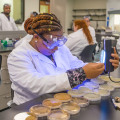Food science is a multidisciplinary programmatic field that applies chemistry, microbiology, engineering, and nutrition to develop new food products and processes to improve food safety and quality. It draws on many disciplines, including biology, chemical engineering, and biochemistry, to better understand food processes and improve food products for the general public. Food science is a practical name used to describe the application of scientific principles to create and maintain a healthy food supply. Food microbiology is one of the most important fields of food science when it comes to product development.
It focuses on bacteria, molds, yeasts and viruses and how they interact with food. Food safety is concerned with the prevention of pathogens in food. It's almost impossible to eliminate microorganisms from any food, but many steps can be taken to slow their growth or inactivate them. What food science is doing in the area of food safety is to develop very sensitive and rapid techniques to identify pathogenic microorganisms and the toxins they produce in food, and to develop packaging and processes that inhibit their growth and reduce their survival rate.
Food engineers develop the concepts that processors use to convert raw materials into safe, durable foods. In menu development, engineers may not play a direct role, but processors do. The way an ingredient is processed can have a dramatic effect on the flavor, color, safety and shelf life of foods. Consider high-pressure processing (HPP) and its effect on the fresh fruit and vegetable juice industry.
HPP is a non-thermal or “cold pasteurization” process developed to allow the production of fruit and vegetable juices without any of the harmful effects of heat treatments, such as changes in flavor, texture or color. The nutritional profile of juices is not altered by the process, so there is no need to fortify them. Nutritionists often associate heat processing with detrimental effects on the nutritional quality of foods, but not always. Recent work at Cornell University showed that heating tomatoes increases the level of a cancer-fighting phytochemical called lycopene. In addition to the core areas, students select at least one area of interdisciplinary concentration or emphasis to personalize the program based on individual interests.
Many students participate in internships at food companies and related industries. Students can receive course credit for internships and, at the same time, gain invaluable professional experience. The Department of Food Science and Human Nutrition also has many scholarships available. The food industry offers a network of careers related to supply, consumption, production, research and development, processing, safety and packaging. Food science graduates work for a variety of companies, industries, government agencies, and academic sectors.
Faculty and advisors maintain close relationships with partners in the food industry who can help with internships, scholarships, and jobs in food-related fields. Nutritional genomics is a relatively new scientific field that applies high-performance genomics such as transectomics (the study of the complete set of RNA), proteomics (proteins) and metabolomics (metabolites) to improve nutrition sciences and food technology. To help consumers make informed decisions about the food they consume, IFT has developed IFT.







Leave a Comment